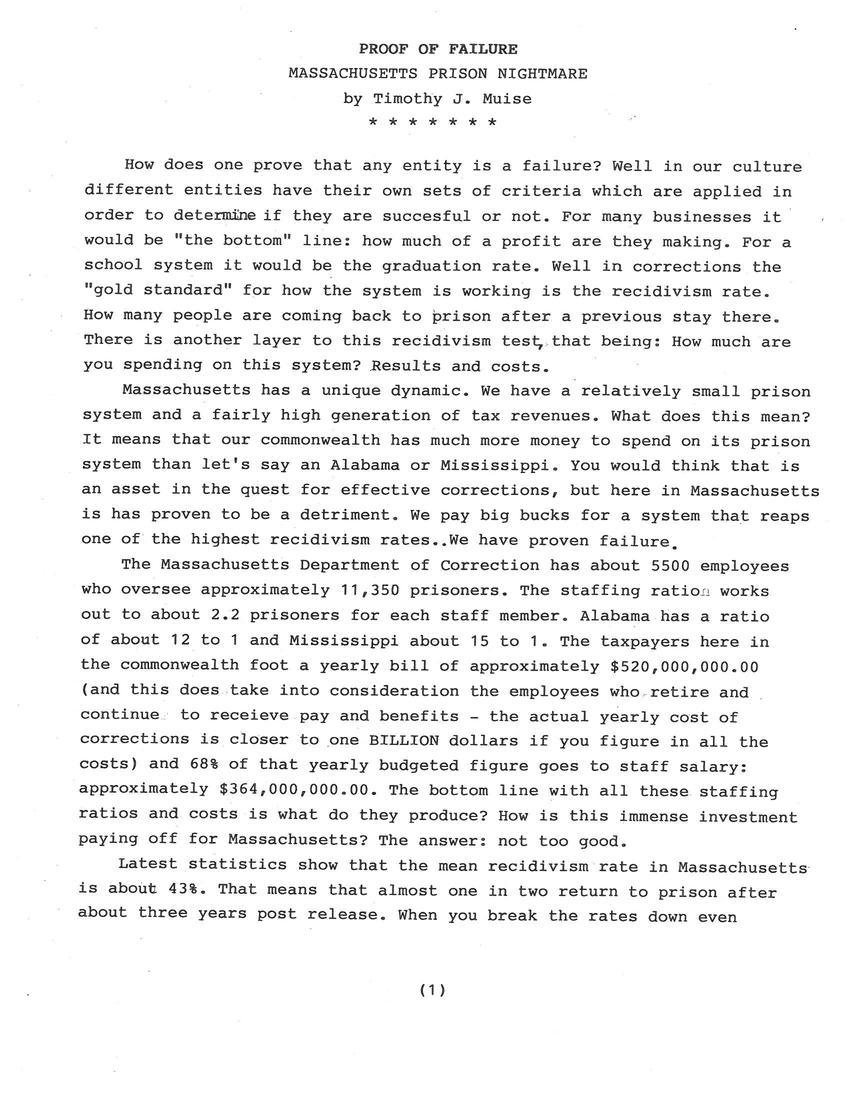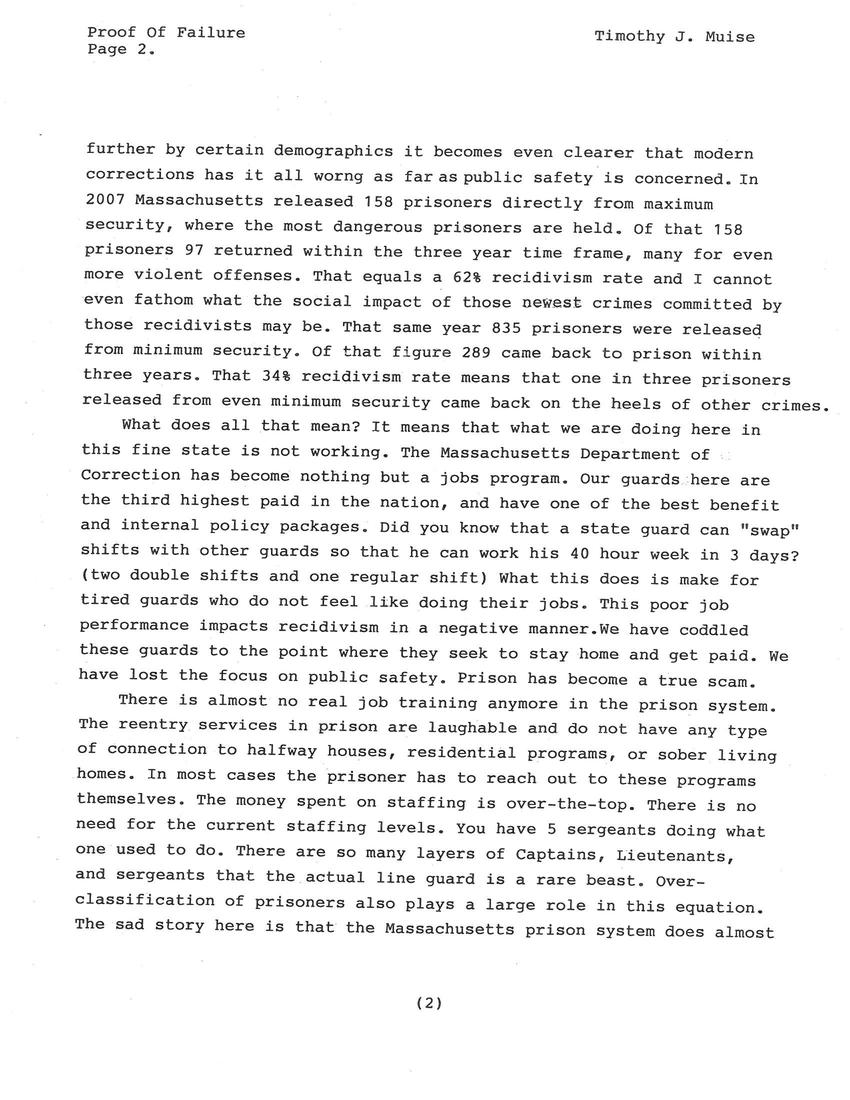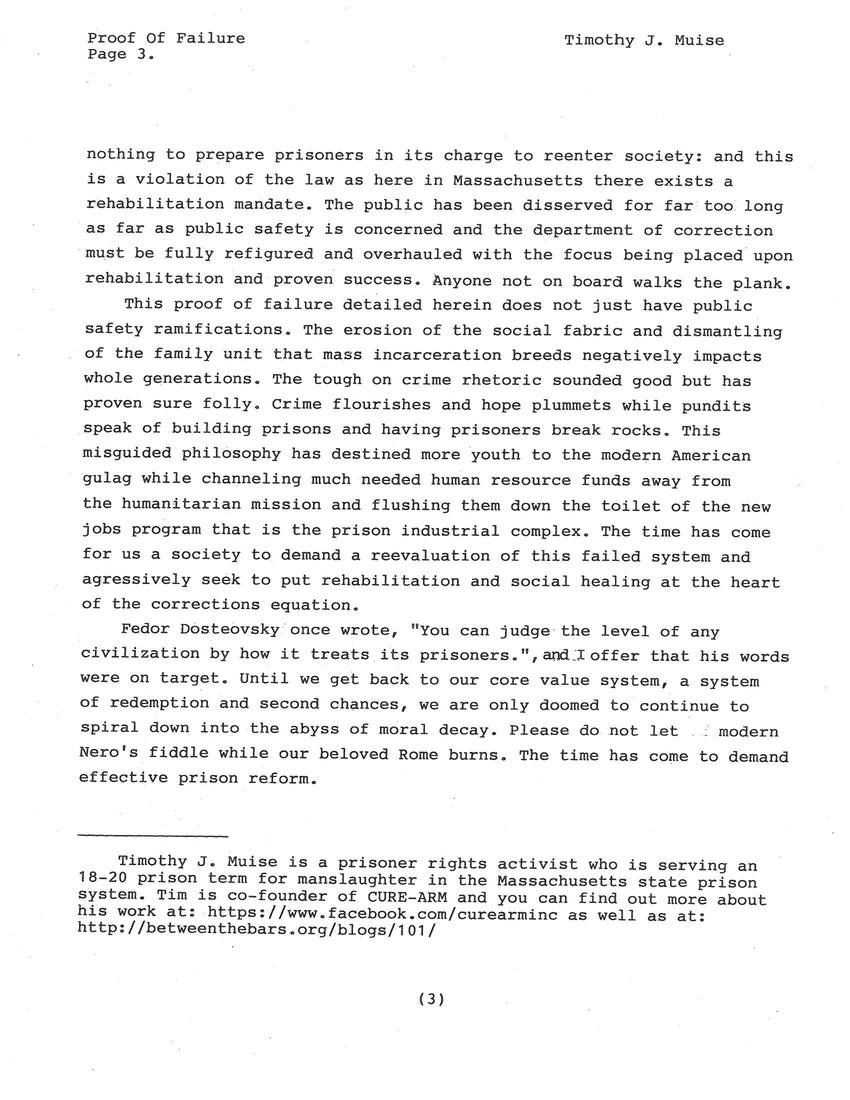
Transcription
Proof of Failure
Massachusetts Prison Nightmare
By Timothy J. Muise
How does one prove that any entity is a failure? Well in our culture
different entities have their own sets of criteria which are applied in
order to determine if they are successful or not. For many businesses it
would be "the bottom line": how much of a profit are they making. For a
school system it would be the graduation rate. Well in corrections the
"gold standard" for how the system is working is the recidivism rate.
How many people are coming back to prison after a previous stay there.
There is another layer to this recidivism test, that being: How much are
you spending on this system? Results and costs.
Massachusetts has a unique dynamic. We have a relatively small prison
system and a fairly high generation of tax revenues. What does this mean?
It means that our commonwealth has much more money to spend on it's prison
system that let's say Alabama or Mississippi. You would think that is
an asset in the quest for effective corrections, but here in Massachusetts
is has proven to be a detriment. We pay big bucks for a system that reaps
one of the highest recidivism rates. We have proven failure.
The Massachusetts Department of Correction has about 5500 employees
who oversee approximately 11 350 prisoners. The staffing ratio works
out to about 2.2 prisoners for each staff member. Alabama has a ration
of about 12 to 1 and Mississippi about 15 to 1. The taxpayers here in
the commonwealth foot a yearly bill of approximately 520,000,000.00
(and this does take into consideration the employees who retire and
continue to receive pay benefits - the actual yearly cost of
corrections is closer to one BILLION dollars if you figure in all the
costs) and 68% of that yearly budgeted figure goes to staff salary:
approximately $365,000,000.00. The bottom line with all these staffing
ratios and cost is, what do they produce? How is this immense investment
paying off for Massachusetts? The answer: not too good.
Latest statistics show that the mean recidivism rate in Massachusetts
is about 43%. That means that almost one in two return to prison after
about three years post release. When you break the rates down even
further by certain demographics it becomes even clearer that modern
corrections has it all wrong as far as public safety is concerned. In
2007 Massachusetts released 158 prisoners directly from maximum
security, where the most dangerous prisoners are held. Of that 158
prisoners 97 returned within the three year time frame, many for even
more violent offences. That equals a 62% recidivism rate and I cannot
even fathom what the social impact of these newest crimes committed by
those recidivists may be. That same year 835 prisoners were released
from minimum security. Of that figure 289 came back to prison within
three years. That 34% recidivism rate means that one in three prisoners
released from even minimum security came back on the heels of other crimes.
What does all that mean? It means that what we are doing here in
this fine state is not working. The Massachusetts Department of
Correction has become nothing but a jobs program. Our guards here are
the third highest paid in the nation, and have on of the best benefit
and internal policy packages. Did you know that a state guard can "swap"
shifts with other guards so that he can work his 40 hour week in 3 days?
(two double shifts and one regular shift) What this does is make for
tired guards who do not feel like doing their jobs. This poor job
performance impacts recidivism in a negative manner. We have coddle
these guards to the point where they seek to stay and get paid. We
have lost the focus on public safety. Prison has become a true scam
There is almost no real job training any more in the prison system.
The re-entry services in prison are laughable and do not have any type
of connection to halfway houses, residential programs, or sober living
homes. In most cases the prisoner has to reach out to these programs
themselves. The money spend on staffing is over the top. There is no
need for the current staffing levels. You have 5 sergeants doing what
one used to do. There are so many layers of Captains, Lieutenants,
and sergeants that the actual line guard is a rare beast. Over-
classification of prisoners also plays a large role in this equation.
The sad story here is that the Massachusetts prison system does almost
nothing to prepare prisoners in it;s charge to re-enter society: and this
is a violation of the law as here in Massachusetts there exists a
rehabilitation mandate. The public has been dis served for far too long
as far as public safety. is concerned and the department of correction
must be fully re-figured and overhauled with the focus being placed upon
rehabilitation and proven success. Anyone not on board walks the plank.
This proof of failure detailed here in does not just have public
safety ramifications. The erosion of the social fabric and dismantling
of the family unit that mass incarceration breeds negative impacts
through out whole generations. The tough on crime rhetoric sounded good
but has proven sure folly. Crime flourishes and hope plummets while pundits
speak of building prisons and having prisoners break rocks. This
misguided philosophy has destined more youth to the modern American
gulag while channelling much needed human resource funds away form
the humanitarian mission and flushing them down the toilet of the new
jobs program that is the prison industrial complex. the time has come
for us a society to demand a re-evaluation of this failed system and
aggressively seek out to put rehabilitation and social healing at the
heart of the corrections equation.
Fedor Dosteovsky once wrote, "You can judge the level of any
civilization by how it treats it's prisoners.", and I offer that
his words were on target. Until we get back to our core value system,
a system of redemption and second chances, we are only doomed to continue
to spiral down into the abyss of moral decay. Please do not let modern
Nero's fiddle while our beloved Rome burns. The time has come to demand
effective prison reform.
Timothy J. Muise is a prisoner rights activist who is serving an
18-20 prison term for manslaughter in the Massachusetts state prison
system. Tim is co-founder of CURE-ARM and you can find out more about
his work at: http://www.facebook.come/curearminc as well as at:
http://betweenthebars.org/blogs/101/
Other posts by this author
|
2017 jun 24

|
2017 jun 24

|
2017 jun 24

|
2017 jun 24

|
2017 jun 18

|
2017 jun 15

|
More... |




Replies (1)